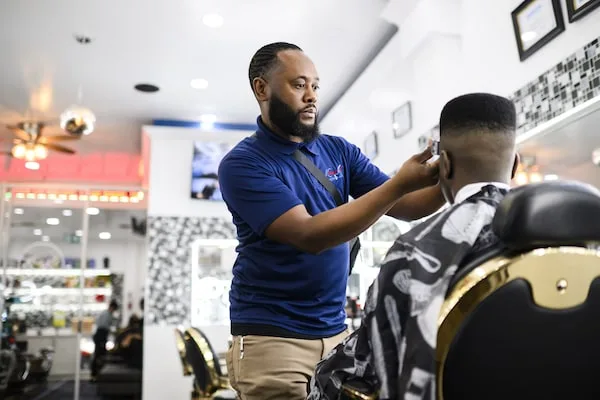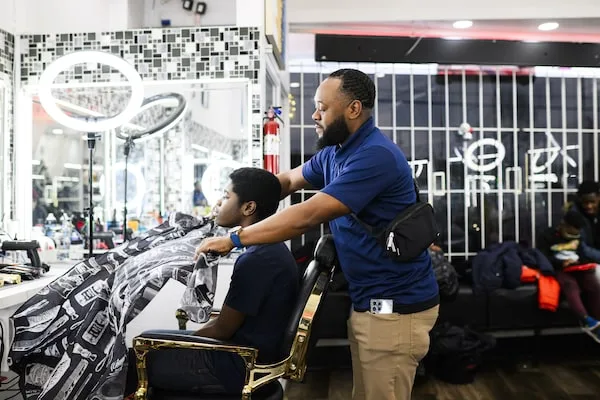
Sheldon Walker gives 15-year-old Khaleel English a haircut at Klean Kut Barbershop in Scarborough on Jan. 6.Christopher Katsarov/The Globe and Mail
Niaimani Thomas’s passion for cutting hair began “back home” in Jamaica.
“I started with a goat that my grandfather bought. I would style the tuft of hair on its head and cut it,” Ms. Thomas said.
Since immigrating to Canada in 2013, Ms. Thomas has continued her passion, trading a goat for the heads of her clients at Klean Kut Barbershop and Salon in the Toronto suburb of Scarborough. There, she says she sees some clients weekly, and like many barbers and hairdressers, has built deep relationships through her practice.
It’s that barber-client rapport that Self Care Through Hair, a new initiative from Black Mental Health Canada (BMHC), is trying to leverage. Through the program, BMHC provides mental-health training to barbers and hairdressers.
The program, which launched last summer, is the first of its kind to utilize barbers and hairdressers to help tackle the stigma and struggle of mental health in the Black community.
“This program empowers barbers as trusted allies and first responders within the community, encouraging clients to share their thoughts openly,” said Duane Wiafe, a registered social worker and psychotherapist.
Mr. Wiafe uses his 15 years of experience as a social worker – with a specialization in the criminal justice system – to provide training for the program. So far, the program has trained seven barbers across the Greater Toronto Area.
Cox: We are failing too many Black Canadians, throughout their journeys
Barbers receive training in Black Mental Health First Response, which is coaching from BMHC that gives participants instruction in how to offer immediate support to a person facing a mental-health crisis.
The training teaches barbers to engage in active listening, recognize trauma and distress and reduce stigma within their communities. It also creates partnerships between the barbershops involved and professional service providers, such as psychotherapists, if barbers and hairdressers want to refer people in need to other experts.
Sheldon Walker, a barber who works with Ms. Thomas at Klean Kut, has been cutting hair for almost 30 years.
“People come to the shop to get their hair cut, to look good, to feel good, but also to chat and to catch up,” he said.
He says that over the years, he’s learned to recognize his client’s moods, and can see when they might be going through something.
“It can be seen as this sort of sacred space, safe space, for those almost secret c




Sheldon Walker, a barber who works with Ms. Thomas at Klean Kut, has been cutting hair for almost 30 years.Christopher Katsarov/The Globe and Mail
onversations some people might not have outside of the barbershop, which makes it a great way to reach members of our community that are struggling,” Mr. Wiafe says.
The Mental Health Commission of Canada highlighted mental-health disparities that came into view as the COVID-19 pandemic took hold. Using a survey conducted by Statistics Canada, the report found that 27.9 per cent of Black visible-minority respondents self-reported fair or poor mental health compared with 22.9 per cent of white respondents.
Alice Wiafe, a registered psychotherapist and president of BMHC, which created Self Care Through Hair, said she expects that the number of Black people facing mental-health challenges is actually higher.
“Black people in general are not very trusting of the system, so they’re not necessarily going to give their whole life story,” she said.
Ms. Wiafe, who helped found BMHC – a charity that aims to improve the mental health of Black Canadians – in 2019, says long-held stigmas about mental health within the Black community widen the gap between people who are struggling and those who seek help.
Since its founding, BMHC has created multiple programs, each with tailored approaches to address mental-health stigma within the Black community, and to provide culturally-appropriate help to those in need. Three of those programs, including Self Care Through Hair, launched in 2023.
BMHC also plans to launch two new programs in 2024, which are being partially funded with the help of $1.1-million committed by the Public Health Agency of Canada last February.
One of the programs, Health Education and Resources for Overcoming Emotional and Mental Health Struggles (HEROES), aims to address continuing mental-health challenges being faced by children. The program will put mental-health education in schools, especially in underserved communities.
For youth, a study published earlier this month by Children’s Healthcare Canada and the Conference Board of Canada found that 1.6 million children and teens in Canada are dealing with a mental-health disorder, with Black, Indigenous and other racialized people disproportionately affected by mental-health challenges.
Like Self Care Through Hair and BMHC’s other programs, the objective of HEROES is to provide easier access to mental-health assistance that is Black-centred and culturally appropriate for Black children in Canada, part of the population that Ms. Wiafe says is disproportionately overlooked, but critical to creating a strong community.
“There’s this quote I love by Frederick Douglass, ‘It is easier to build strong children than to repair broken men,’ ” she said.


